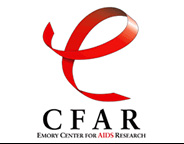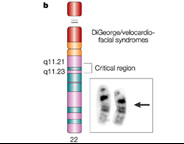 |
 |
|||
| September 30, 2009 | ||||
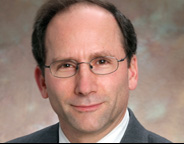 James Steinberg, MD |
Sound Science: Preparing for novel H1N1 Listen to Sound Science as James Steinberg, MD, discusses H1N1 and what we can expect from this flu virus. Why has the World Health Organization declared the H1N1 outbreak a pandemic, how does H1N1 differ from seasonal flu, and how should we prepare to prevent and treat it? Read and listen. . . |
|||
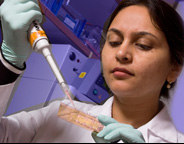 Dipali Sharma, PhD |
Emory External Research Funding Increases 18 Percent, Tops $484 Million Emory scientists received $484.2 million from external funding agencies in FY09, an increase of 18 percent over FY08. The WHSC received 92 percent of the total, or $446.5 million, and $298.5 million came from the NIH. Emory researchers submitted more than $1 billion in research proposals in FY09. Read more. . . |
|||
Emory CFAR Will Serve as Atlanta Host for Global AIDS Vaccine 2010 Conference The Emory Center for AIDS Research will serve as Atlanta host for AIDS Vaccine 2010, the largest and most important global scientific conference on AIDS vaccine research. The conference, from Sept. 28-Oct. 1, 2010, will include more than 1,000 scientists, community advocates, funders and policy makers from around the world. Read more. . . |
||||
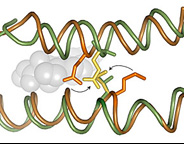 Clash between gene mutations in a hormone receptor. |
Evolution Doesn't Run Backwards Biochemists who specialize in resurrecting ancient proteins can deduce how similar proteins in different organisms evolved from a common root, mutation by mutation. But protein evolution can't be rewound to take the same path backwards. Mutations arise for a variety of reasons, and reverse evolution would cause a tangled mess. Read more. . . |
|||
Uncovering Schizophrenia Genes Although scientists know there is an inherited component to schizophrenia, dissecting out the individual genes involved has been difficult. An Emory team focusing on rare gene variants is helping unravel the causes of this complex disease. Read more. . . |
||||
 |
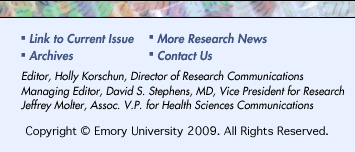 |
|||
